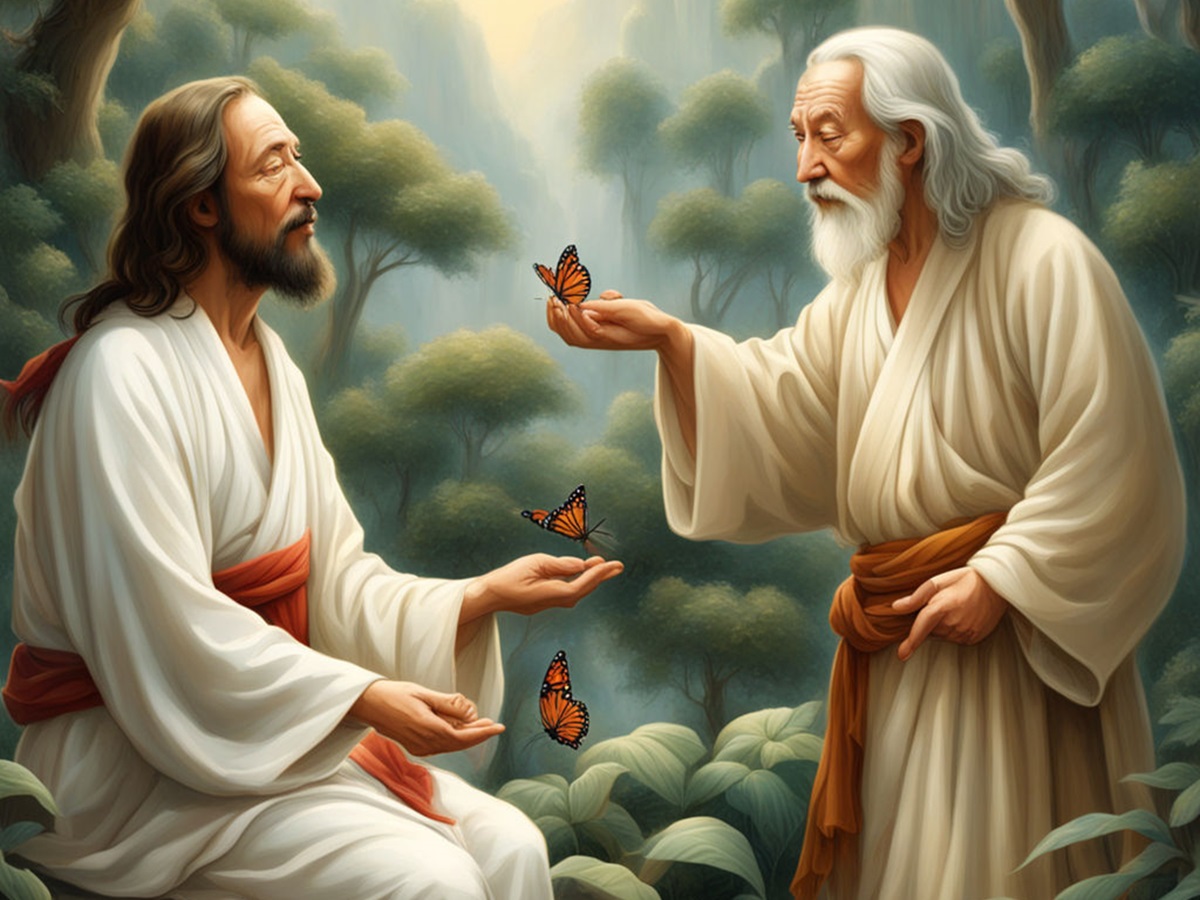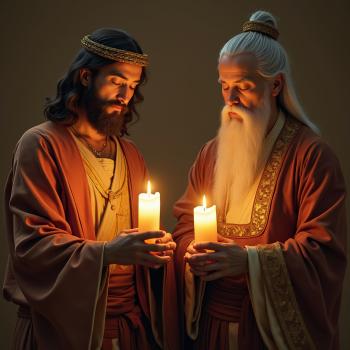What does Jesus mean when he talks about eternal life? The Chinese philosopher Lao Tzu provides a clue. Both claim that we are immortals.

For Lao Tzu, when a person lets go and becomes completely fulfilled, they come into alignment with the infinite, eternal Tao. Their life takes on an unlimited quality, not a limitless quantity. This kind of never-ending life doesn’t fall prey to a false assumption that human beings can escape death. Lao Tzu’s immortality means more than some notion of an afterlife. It means recognizing that you are, and always have been, an immortal.
Tao Te Ching, Verse 7
Stephen Mitchell Translation
The Tao is infinite, eternal.
Why is it eternal?
It was never born;
thus it can never die.
Why is it infinite?
It has no desires for itself;
thus it is present for all beings.
The Master stays behind;
that is why she is ahead.
She is detached from all things;
that is why she is one with them.
Because she has let go of herself,
she is perfectly fulfilled.
Eternal Life in Taoism
By “eternal life,” most Christians usually mean stepping through the pearly gates after death, living forever with God. Taoism doesn’t worry much about the afterlife but concentrates on the here and now. Still, many Taoists would say they believe in a form of eternal life. This is what happens when a person aligns with the Tao. They let go of themselves, and so become perfectly fulfilled. How does this happen? It happens when we realize that, like the Tao, we are infinite and eternal. Thus, you can understand that, in a sense, you were never born, and can never die.
Can a Person Live Forever?
Can a person live forever? Certainly not! Rationalists rightfully argue against any literal form of eternal life. After all, the conquistadors never discovered the Fountain of Youth, no matter how hard they tried. In a physical and actual way, everything living has a birth and a death.
Yet to many, it seems there is some numinous quality of “life with a capital L” that defies rational explanation. So, religionists speak of eternal life but misunderstand its meaning. Christians use the phrase “eternal life,” while simultaneously arguing against the plain meaning of the word “eternal.” Orthodox Christianity recognizes the immortality of the soul and the hope of resurrected life stretching into future eternity. Yet, most Christians restrict any view of immortality to the eternal future, not an infinite past.
Traditional Christianity claims that there was a time when you were not. Then, at some point later, you came into being. You were created. At conception, birth, or your first breath, your life started. So, while Christians might say you have future immortality, most would assert that you aren’t immortal, going backward in time. In this way, Christians actually argue against their own doctrine of eternal life.
Nothing New Under the Sun
Still, despite these arguments, the Tao Te Ching and the Bible both assert that there was never a time when you were not. Since everything exists within God (or Tao), and this Ultimate Reality has always existed, then everything that exists within it is likewise eternal. Consider these words from the author of Ecclesiastes:
A generation goes, and a generation comes,
but the earth remains forever.
The sun rises, and the sun goes down
and hurries to the place where it rises.
The wind blows to the south
and goes around to the north;
round and round goes the wind,
and on its circuits the wind returns.
All streams run to the sea,
but the sea is not full;
to the place where the streams flow,
there they continue to flow.
All things are wearisome,
more than one can express;
the eye is not satisfied with seeing
or the ear filled with hearing.
What has been is what will be,
and what has been done is what will be done;
there is nothing new under the sun.
Is there a thing of which it is said,
“See, this is new”?
It has already been
in the ages before us.
According to Ecclesiastes, everything that exists has already existed before. Everything is eternal, and everyone is immortal. We just don’t all realize it.
All Things in Christ
There is a sense in which nothing has ever been born, and nothing will ever die. Nothing is new now. Nothing was new a million years ago. And into the future, nothing will be old. Why? Because we are all in Christ, who is eternal. Referring to Christ, the author of Colossians says:
He is the image of the invisible God, the firstborn of all creation, for in him all things in heaven and on earth were created, things visible and invisible, whether thrones or dominions or rulers or powers—all things have been created through him and for him. He himself is before all things, and in him, all things hold together. He is the head of the body, the church; he is the beginning, the firstborn from the dead so that he might come to have first place in everything. For in him all the fullness of God was pleased to dwell, and through him, God was pleased to reconcile to himself all things…
This is what Colossians says of Christ. But the same things the Bible says about Jesus are also true for us. Why? Because we are made of the same godstuff.
Partakers in the Divine Nature
If all things are made, held together, and reconciled through Christ (eternal, without beginning or ending) then we are likewise “partakers in the divine nature (2 Peter 1:4).” That is not to say that we are gods—who would want to be a heavenly being seated on a throne? Instead, it means that we are eternals—and that is intriguing!
We are in Christ, who was before all things and is himself the Beginning. In this way, we connect with the infinite past. We are in Christ who reconciles all things for the future, so we are united with him forever. And we are in Christ who holds all things together in the eternal now. Therefore, we are immortal just as Christ is eternal. Like the Tao, in this sense we were never born and will never die. Just like Jesus, the Alpha and Omega, we share in the divine nature and this same unending quality. This is what eternal life really means.
One With All Things
Thus, the Christian no longer looks at anything or anyone from a worldly point of view. Instead, we recognize that we are one with all things and all people. We are reconciled with each other and with the universe. Lao Tzu says that the sage who understands this “is detached from all things; that is why she is one with them.” Christians can echo this Taoist principle. Because of our complete unity in Christ, believers can detach themselves from grasping after possessions, positions, and glory.
Perfectly Fulfilled
Lao Tzu wrote, “The Master stays behind; that is why she is ahead.” We see this illustrated in the Gospels. When Jesus’s disciples debated with each other who was the greatest among them, the Master told them, “Whoever wants to be first must be last of all and servant of all.”
Pride and position mean nothing to the one who is united with all things. Satisfaction comes, not from being the first or the greatest. Instead, it comes from assisting the needy and supporting those who work for the good of all. The Tao Te Ching says, “Because she has let go of herself, she is perfectly fulfilled.”
Something to Pray…
Alpha and Omega, first and last, infinite and eternal, you hold me in your bosom. Even as wisdom existed before the foundations of the world, so I abide in you eternally. Just as Jesus said, “Before Abraham was, I AM,” I can also know that I was never born, and will never die. The scripture says, “And this is eternal life, that they may know you, the only true God, and Jesus Christ, whom you have sent.” In that knowledge of my unending Source, and Christ who makes that Source known, I recognize my own eternal quality, from beginning to end. May I rest in this Eternal Now, and so be completely fulfilled.














